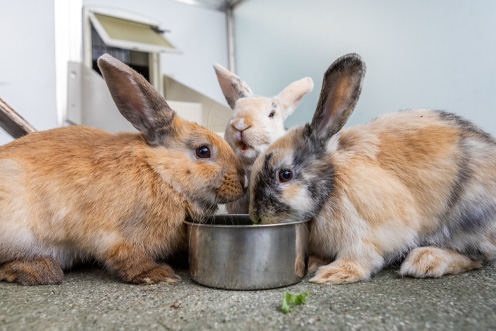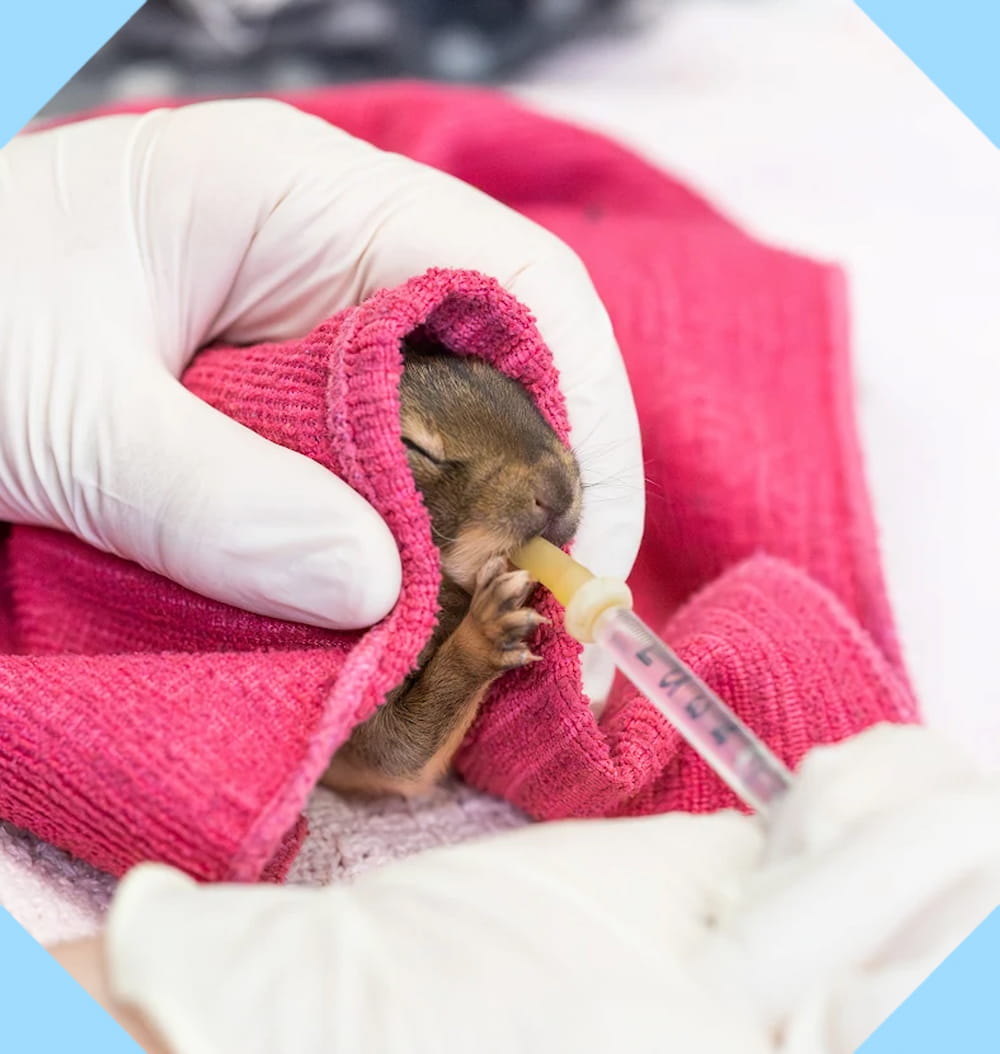The oldest recorded rabbit, Flopsy, was born in Australia in 1964...
Rabbit facts
We could rabbit on about them all day – instead, here are some of our favourite rabbit facts:
- Rabbit males, females and babies have different names: Male rabbits are called bucks, female rabbits are called does, and rabbit babies are called kits.
-
Rabbits are incredibly social animals: When they’re kept with a suitable rabbit companion, rabbits feel happier, safer, calmer and are less prone to stress. They even play tricks on one another.
-
Rabbits are also very territorial: They form complicated social structures, and when kept together, rabbits form a ‘pecking order,’ with some animals becoming more dominant than others.
-
A group of rabbits is called a colony, a nest, or a warren.
-
Rabbits eat their own droppings: Food is passed through their gut and special droppings (‘caecotrophs’) are produced. Rabbits eat these, allowing the food to be re-ingested, getting maximum nutrition.
-
Rabbit teeth never stop growing: Their front teeth grow at a rate of 3mm a week! This is why hay is essential for rabbit dental health; it promotes constant, side-to-side chewing that wears down their continuously growing teeth, preventing problems.
-
Rabbits are intelligent: Just like dogs, pet rabbits can be taught to respond to commands using positive reward-based training. You can even teach them fun tricks, like high-fiving or fetching a toy!
- Rabbits purr: When they’re happy their teeth chatter gently, creating a soft purr (but teeth grinding can also be a sign of pain).
-
Rabbits need more space than you might think: In the wild, they live in interconnecting underground tunnels. These can cover more than two acres and house 50 rabbits!
-
Rabbit can do more than just hop: Have you ever seen them leap really far, twisting and kicking midair? That’s called a ‘binky.’
-
Newborn kits are born blind (eyes firmly closed) and bald: Fur begins to grow a week later, and the kits typically open their eyes for the first time after 10 days.
-
A female rabbit can get pregnant at just four months old: Does can get pregnant very young, and are pregnant for just four weeks. She’ll have one to 10 kits in each litter, and if she wants to, she can get pregnant again within hours! In one year, two rabbits could multiply to 82 rabbits!
-
Rabbits are most active at dusk and dawn: This is called being ‘crepuscular,’ and means they’re most active at two specific points: dusk and dawn. This is different to being nocturnal, as nocturnal animals are more active throughout the entire night.
- Rabbits have incredible vision: They can see in almost every direction with their nearly 360° vision. Because rabbit eyes are on the sides of their head, they have a blind spot just under their chin and directly in front of their nose.

How long can rabbits live?
The lifespan of a rabbit is largely dependent on how healthy and happy they are.
If they live in a safe and stimulating environment, with a nutritious diet and plenty of company, a rabbit can typically live for 8 to 12 years – but some may live longer.
This means that pet rabbits are a long term commitment, as much as any pet cat or dog might be. And an incredibly rewarding one, too.
Average timeline of a rabbit’s life:
- Gestation period: 30 to 33 days
- Average litter size: one to six kits
- Kits open their eyes: 10 days old
- Kit weaning period: between 4 to 8 weeks
- Puberty begins: at 3 to 5 months old
- Does fully mature: 7 to 8 months old
- Bucks fully mature: 8 to 9 months old
- Rabbits become ‘senior:’ at 5 to 8 years old
Did you know?
test your knowledge
...Flopsy lived for almost 19 years!
Rabbit body language
Rabbits express a range of emotions, from curiosity to caution, fear to friendship. They’re constantly communicating.
Some body movements to look out for are:
- The jump for joy: The leap-twist that a rabbit does midair – the binky – is a sign that they’re very happy.
- Bunny boxing: If a rabbit is on their hind legs, ears up, lifting their front paws to bat at anything that comes close, sometimes accompanied with a growl, then the chances are they’re feeling aggressive and upset.
- Nipping (not biting!): If a rabbit gently nips you, they might be trying to groom you or get your attention.
- Ears stood to attention: If a rabbit’s ears are forward and they’re staring at a certain spot – sometimes on their hind legs, sometimes on all fours – they’re likely on high alert.
- Trademark thumping: When a rabbit thumps their hind legs, it can actually mean that danger is nearby – or it’s a ‘grump thump’, and they’re mad at you.
Do rabbits need company?
Rabbits are a highly social species, yet 42% of pet rabbits in the UK lived alone in 2024. They need companionship almost as much as they need a healthy diet. Two rabbits together can swiftly become best friends, if bonded appropriately – they're sociable creatures who suffer when alone, even developing abnormal behaviours without a companion.
Bunnies need buddies. A good combination is a neutered male and a neutered female, as neutering reduces the likelihood of fighting in both sexes.
Did you know? Sometimes rabbits mount one another, even after they’ve been neutered, as it’s not just a sexual behaviour, but a show of dominance.
Pet rabbits can see humans as important companions, too. If your rabbit has to be kept alone (which should only be the case if advised by your vet), it’s vital you interact with them daily.
It’s better to adopt rabbits rather than buying them from a pet shop. That way you know you’re giving them a second chance. Also, RSPCA staff made sure our pair were toilet trained and neutered, and advised how to look after them.
Do rabbits make good pets?
Rabbits can make great companions. They’re quiet, clean, gentle, affectionate, can use litter trays and even be trained.
As they have long lifespans, they’re also a big commitment, requiring high quality care, routine vet visits and constant attention.
If you’re thinking of buying a pet rabbit, or searching for rabbits for sale, consider adopting a rabbit instead – preferably two together. We have many rabbits at our rescue centres, and because they form deep connections with the rabbits they live with – becoming what us humans would call ‘best friends’ – we usually rehome them in pairs.

Are rabbits a good pet for children?
Rabbits can make great pets, but they are complex animals with complex needs. They’re better suited for older children who are able to handle them gently and understand the full scope of their responsibility, with adults around who are prepared to put in the time to help, support and take over when needed.
No child should be the sole owner of any animal – adult supervision is always recommended.
While intelligent and sociable, rabbits require careful, long-term commitment, including specialised care, space, and financial resources for a specialist vet. They’re fragile creatures that can be easily injured, and as ‘prey’ animals, they prefer not to be picked up.
With that in mind, for children who are older and ready for the shared responsibility, rabbits are incredibly fun and rewarding pets. We will always encourage children to help with pet care, and as intelligent and inquisitive animals, there are many activities children can get involved in to keep their bunny happy and entertained.
Caring for rabbits
Rabbits come in a variety of breeds, shapes and sizes, and each bunny has their own unique personality. Rabbits require long term commitment as they typically live for 8 to 12 years, but some may live longer.
Pet rabbits are related to the wild European rabbit and the biology and behaviour of pet rabbits is very similar to that of their wild cousins.
Top facts about rabbits:
- Rabbits are highly social animals - they must not live on their own unless advised by a vet. See our advice page on how to introduce rabbits to each other.
- Rabbits are territorial animals and form complicated social structures.
- Rabbits have an unusual digestive system – food is passed through their gut and special droppings (‘caecotrophs’) are produced. Rabbits eat these, allowing the food to be re-ingested, getting maximum nutrition. Ensure your rabbit's digestive system is kept in tip-top condition by feeding them a healthy diet.
- Rabbits have continuously growing teeth – a rabbit's top front teeth grow at a rate of 3mm a week! Keep your rabbit healthy by following our health and welfare advice.
- Rabbits are intelligent – pet rabbits can be taught to respond to commands using positive reward-based training. Discover more about rabbit behaviour.
- Rabbits need far more space than you might think. In the wild, they live in interconnecting underground tunnels. These can cover more than two acres and house 50 rabbits! We have lots of information on how to house your pet rabbit, so they feel at home.
-
A female rabbit (a ‘doe’) can get pregnant when she’s four months old and is pregnant for just four weeks. She’ll have one to 10 kits in each litter and can get pregnant again within hours! The female kits can also get pregnant when they’re just a few months old. In one year, two rabbits could become 82! To avoid unwanted litters, take a look at our guide to sexing and neutering your rabbits.
Find out more and adopt a rabbit from the RSPCA
We have hundreds of rabbits in our care who are all looking for loving new homes. Start your search for a rabbit today.
Rabbit care guide
Rabbits have a complex set of needs and feel a range of emotions – all of which need to be cared for.
Explore our full rabbit care guide below, including information on general health, home and environment, diet, mental stimulation and companionship.










